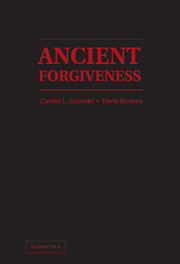1 - What Is Forgiveness?
from Part I - The Territory Philosophically Considered
Published online by Cambridge University Press: 05 January 2012
Summary
Concepts versus Territories
What counts as forgiveness? Suppose that a person says that she forgives you but she clearly feels great hostility to you. Is she misusing the word? Suppose that a word in some text from another civilization is translated as “forgiveness” although the text describes the execution of “forgiven” people. Is this a mistranslation? One way to approach such questions would be to make a theory of forgiveness, laying out the conditions that have to be met for one person to forgive another. Then, if a person or a text uses a word in a way that violates these conditions, we would take it that forgiveness is not really the topic.
That is the procedure suggested by standard analytical philosophy. It is well suited for debunking, and there is always a lot of bunk around. But, for all its attractiveness, I think it is not the best approach here, for two reasons.
Information
- Type
- Chapter
- Information
- Ancient ForgivenessClassical, Judaic, and Christian, pp. 3 - 14Publisher: Cambridge University PressPrint publication year: 2011
Accessibility standard: Unknown
Why this information is here
This section outlines the accessibility features of this content - including support for screen readers, full keyboard navigation and high-contrast display options. This may not be relevant for you.Accessibility Information
- 2
- Cited by
